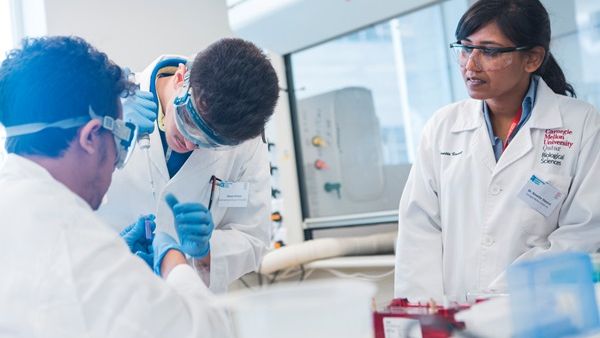CMU-Q Researchers Awarded 4 NPRP Grants

Carnegie Mellon University in Qatar (CMU-Q) has been awarded four National Priorities Research Program (NPRP) grants by the Qatar National Research Fund. The grants will fund CMU-Q faculty studies on breast cancer, water quality, computer science education, and marine environmental monitoring.
“This is an exceptional outcome for CMU-Q,” says Kemal Oflazer, associate dean for research. “Although these projects focus on very different aspects of biological sciences and computer science, each has the potential to make a significant impact in its area.”
Saquib Razak, associate teaching professor of computer science, was awarded a grant to expand Alice Middle East, an interactive software tool that guides students through the basics of computer programming. With the NPRP grant, Razak and the Alice ME team will develop a three-year curriculum for local middle schools. The new curriculum will focus on computational concepts and critical thinking, which are crucial skills for young people as they enter the workforce.
Ihab Younis, assistant teaching professor of biological sciences, was awarded a grant to study the molecular indicators of breast cancer, which is the most commonly diagnosed cancer among women in Qatar. The project also seeks to add to the database of breast cancer biomarkers, which will have direct impact on diagnosis and provide novel therapeutic targets and approaches to treatment.
Annette Vincent, assistant teaching professor of biological sciences, was awarded a grant for her project on water quality within Qatar. The project uses bacteriophages—viruses that infect bacteria—as biomonitoring tools to provide a more accurate assessment of the types of bacteria present in the water. Vincent’s research could have important implications for Qatar’s water security, perennially a top priority in a country where the drinking water is desalinated seawater.
Vincent will collaborate with Basem Shomar, principle investigator of environmental and chemical sciences at Qatar Environment and Energy Research Institute, part of Hamad Bin Khalifa University.
Gianni Di Caro, associate teaching professor of computer science, will investigate the monitoring of marine environments over extended periods of time. Di Caro’s team seeks to develop swarms of unmanned aerial and surface robots that are equipped with GPS devices and sensors for environmental monitoring. Because the system will be designed for use in long-running missions, it will allow for repeated, time-indexed data sampling that can help develop distributed and scalable solutions for controlling individual and system-level behaviors.
Background Information
Carnegie Mellon University Qatar
For more than a century, Carnegie Mellon University has challenged the curious and passionate to imagine and deliver work that matters. A private, top-ranked and global university, Carnegie Mellon sets its own course with programs that inspire creativity and collaboration.
In 2004, Carnegie Mellon and Qatar Foundation began a partnership to deliver select programs that will contribute to the long-term development of Qatar. Today, Carnegie Mellon Qatar offers undergraduate programs in biological sciences, business administration, computational biology, computer science, and information systems. Nearly 400 students from 38 countries call Carnegie Mellon Qatar home.






